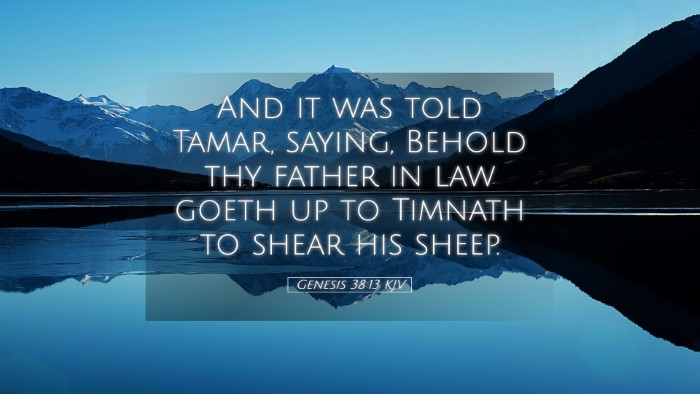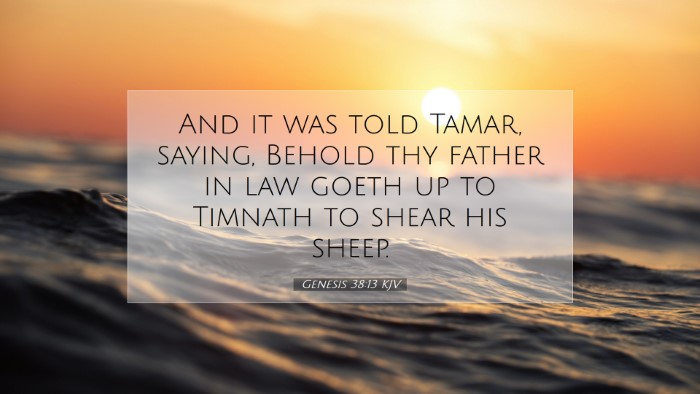Commentary on Genesis 38:13
Genesis 38:13 states: "And it was told Tamar, saying, Behold, thy father-in-law goeth up to Timnath to shear his sheep." This verse marks a pivotal moment in the narrative of Judah and Tamar, highlighting themes of justice, levirate marriage, and familial obligation.
Context of the Passage
In order to understand the significance of this verse, it is important to consider the broader context of Genesis 38. This chapter serves as a narrative interlude in the larger story of Joseph, and it centers on Judah, one of the sons of Jacob. After the sale of Joseph into slavery, Judah separates from his brothers and marries a Canaanite woman. Their family dynamics set the stage for Tamar's complex situation.
The Role of Tamar
Tamar is introduced as the widow of Judah's firstborn son, Er. Following Er's death, according to the levirate law (Deuteronomy 25:5), Judah was obligated to provide Tamar with another son to continue Er's lineage. However, Judah fails to fulfill this duty, which places Tamar in a precarious position and emphasizes the importance of familial responsibilities.
Insights from Matthew Henry
Matthew Henry notes that the news of Judah's visit to Timnah for sheep-shearing was significant because it reflected his return to a more societal activity, away from his earlier indiscretions. Henry emphasizes Tamar’s proactive stance when she learns of Judah's journey; it indicates her understanding of her situation and her willingness to ensure her rights and lineage. He suggests that Tamar's actions should be viewed within the context of her desperate circumstances, drawing attention to her need for justice and restoration.
Reflections from Albert Barnes
Albert Barnes emphasizes the cultural implications of this verse. He argues that sheep-shearing was not merely an agricultural duty, but a time of festivity where communal gatherings occurred. Therefore, Tamar's knowledge of Judah's journey suggests that the news traveled, highlighting the interconnectedness of the community. Barnes remarks that Tamar's response to this information reflects her astuteness and awareness of her cultural rights, which contrasts sharply with Judah’s neglect of his obligations.
Views from Adam Clarke
Adam Clarke elaborates on the concept of levirate marriage and Judah's failure to adhere to this responsibility. He points out that Tamar's plight is emblematic of many women in biblical narratives who find themselves in situations of vulnerability and injustice. Clarke interprets this moment in Genesis as a profound exploration of moral duties and consequences within familial structures. He underscores the tension between law and action, suggesting that Judah's behavior instigates Tamar’s desperate measures, leading to the unfolding drama of the story.
The Theological Significance
The events following Genesis 38:13 raise critical theological and ethical questions regarding justice, righteousness, and the divine plan. This passage can be seen as not just a family saga but a larger commentary on God's interaction with humanity, showcasing the complexities of human relationships and God's redemptive purposes even through flawed characters.
Application for Pastors and Theologians
- Understanding Familial Obligations: Pastors should highlight the importance of familial duties and the ramifications of neglecting them.
- Empowerment of Vulnerable Individuals: Tamar's story serves as a reminder of the need to advocate for those who are marginalized and vulnerable in society.
- Exploring Themes of Justice: The complexities of justice in Tamar's case prompt deeper discussions about how justice is administered within a faith community.
- Interconnection of Human Choices and Divine Purpose: This narrative arc serves as a rich exploration of how human decisions can align with or deviate from God’s plans.
Conclusion
The examination of Genesis 38:13 within the context of public domain commentaries reveals a multifaceted narrative that extends beyond a simple recounting of events. Through the insights of Matthew Henry, Albert Barnes, and Adam Clarke, scholars and pastors can draw profound lessons about duty, justice, and the complexities of human relationships under divine scrutiny. Tamar's story remains a compelling testament to the intricate tapestry of biblical narratives, urging believers to reflect on their moral obligations and the overarching sovereign plan of God.


